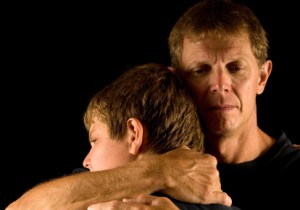|
|
July 14, 2010
When I ask t(w)eens what makes a real friend vs. the Other Kind, the word “loyal” usually tops the list, along with respectful, trustworthy and fun to be with. When I ask how a friend shows loyalty I usually hear stuff like:
“They are there for you even if other people ditch you.”
“They’d never flirt with your crush or go out with your ex!”
“They don’t talk about you behind your back.”
“They always have your back.”
“They stick up for you even when you’re not around.”

After reading today’s Zits, I wonder if loyalty also requires you to hate the people your friends hate. And if you don’t hate your friends’ enemies or demonstrate a “sufficient level of distain,” by teasing, bullying and otherwise harassing said “enemy”, does that make you a bad friend? Put you at risk for landing on your friend’s Enemies List?
Probably.
Hmmm. Sounds like this might be a conversation worth having with your friends (or with your kids.). Your thoughts?

July 12, 2010
 Things are going to different... better for all of us. Last week I stuck it to parents who, wittingly or un, permit bullying at home. If I weren’t such an uncompromising child advocate this might be where I apologize for offending. Sorry. No regrets about what I wrote. It was the truth. It was helpful. And it’s totally necessary for us to understand that love for our kids can’t ever be so blind that it keeps us from giving them a needed course correction.
For the record, more people read, tweeted and commented on that blog than anything I’ve cranked out in the past 2 years. Lots of thumbs up and to my knowledge, not a single parent bent out of shape. In fact one mom asked when I’d be serving my tips on “What to do if my kid is a bully?” Thanks for asking. I’m getting there.
Before I do I’ve gotta say I’m not keen on labels. There’s a huge difference between “My kid’s behavior is sometime/often aggressive, controlling and insensitive to the feelings of others” and “My kid’s a bully.” It may seem like PC BS semantics but it’s more than that. When you label a child you add a mantra to that kid’s internal monologue. Tell him he’s “bad,” tell her she’s a “bitch,” tell them they’re “worthless” and their young psyches start agreeing. Without meaning to you’re pushing them down the path you were trying to yank them off. You also provide them with excuses to continue misbehaving. “I can’t help it. I’m just a bad kid.”
So please don’t label your kid with “bully” or any other insult, even if (s)he’s acting that way.
Tips for changing bullying behavior.
1. Acknowledge the truth — When your child engages in behavior that’s meant to degrade or intimidate anyone (including you), see it for what it is. Name it. “My child is acting like a bully”.
2. Jump on it — Tell your kid exactly why what (s)he did is not OK. “Cruel’s not cool! Not at school. Not online. Not in this family. Not ever. Consider this a warning. The next time you talk to us that way, there will be a consequence.” And when “next time” happens follow up with the consequence. Don’t apologize. Don’t negotiate. And do not feel guilty! Threatening empty action is not only ineffective parenting, it also undermines your leadership and accountability. On top of that, it makes you look like a wimp in your child’s eyes. No way to earn the respect you say you want.
3. Get it on the record — At a family meeting discuss the ways each person shows respect and disrespect. Talk about a need for change in the direction of more respect & cooperation from everyone. Together create a set of agreements. The first one should be: In this family, we will always treat each other with respect. Parents and children are not equals in the family. Obviously we don’t share the same rights and privileges. But when it comes to following the Respect Rule, we are all equal.
Agree on consequences for not keeping the #1 rule. NOTE: Consequences need to matter to the child. “No TV” is meaningless if the kid’s got 10 other ways to entertain herself, including a laptop where she can download the show you told her she can’t watch.
4. Hold yourself accountable — Children repeatedly engage in unacceptable behavior (whining, cursing, silent treatment, hitting, door-slamming, screaming, non-cooperation, etc.) because parents let them get away with it and there is a payoff. If your son or daughter consistently acts like a bully at home, it is because you’ve allowed it. What you permit you promote.
NOTE: Hold yourself and your partner accountable for acting like a bully to each other and/or to the kids. Commit yourself to making changes in your own behavior.
5. Explore your typical response to your child’s most uncooperative behavior — If what you usually do hasn’t corrected the behavior yet, it’s not going to. If you need help regaining your leadership role in the family, read a parenting book, listen to a parenting podcast, take a parenting class, invest in a session with a licensed Marriage and Family Therapist or a Parenting Coach. In other words, if you need help, get it.
6. Be prepared for serious push-back — Kids who’ve been getting their own way for years are not suddenly going to become model team players just because you’ve gotten a backbone transplant. They will test to see if you mean business. Hang tough and show them you do.

July 2, 2010
 Me? A Bully? Yeah, right! This won’t be an easy read. But if the title pulled you in, you may already have some suspicions (or hard evidence) that your kid engages in mean-spirited behavior that hurts others. No parent wants to admit their kid is a bully, but according to a recent U.S. Department of Justice study, 77% of students nation-wide reported having been bullied, verbally, mentally or physically, in school in the past month. Lots of tormentors. Each one is somebody’s child. Would you know if (s)he was yours?
Hints that your child may be a bully:
1. You or your partner is a bully. The family is Ground Zero for learning about emotional responses and relationships. If a parent consistently yells or uses verbal threats, emotional blackmail or physical violence to manipulate family members, that’s what the child learns. And that learned aggression is likely to come to school with him/her. If you’re a bully it may be difficult for you to see it. If you’re wondering, ask your partner or your child “Do you think I’m a bully?” Hopefully they’re not too afraid to tell you the truth.
2. Your child is bossy at home. Is she demanding? Do things have to be her way or she throws a fit? Curses at you? Threatens? Gives you the silent treatment? Refuses to cooperate? Takes it out on siblings? If you made a short list of adjectives describing your child would you paint a portrait of someone you admire? If you admit she’s self-centered, controlling, insensitive at home, why assume she’s consistently caring and supportive at school?
3. Your child’s close friends are not the nicest people. You may not trust them without knowing why. Or you may have good reasons not to respect the choices these kids make. If so, talk to your child (calmly and respectfully) about these friends. This isn’t about labeling or demonizing. And it’s surely not about getting into a power struggle with your child about who she can and can’t be friends with. This is about understanding your child. Be compassionately curious about his friendships and he’s likely to open up. Your intent is to find out what your child likes about his friends and which ones, if any, your child may not be 100% comfortable with.
4. Your child makes rude comments about other kids. Tune in to conversations between your child and her friends. What kind of language do they use to describe other kids? How often do you overhear gossip, a rude put-down, or a “joke” being made at someone else’s expense?
Ask your child to tell you about the social hierarchy in her grade. Kids often like to display their expertise and you’ll be surprised at how detailed they get about who’s “in” and who is so not. Some kids will literally draw you a picture of the school’s social landscape! Listen closely as your child describes the kids who aren’t popular. Or the ones who are. Do you hear derogatory language? (“He’s such a loser.” “She’s such an ugly bitch.” “Fat!” “Retard!” “Whore.”) If your kid freely talks this way in your presence, there are no barriers to the hurtful words (s)he’ll say, text or post when you’re not around.
Parents of tweens and teens assume that their days of influencing their children are over. Not so! While it’s a fact that friends’ opinions are important, so are yours. You still have tremendous influence on your child’s values and behavior, and you always will. Even after your kids are grown with kids of their own.
If you are aware that your child is a bully or leaning in that direction, it’s up to you to provide a course correction. When each parent does their job… bullying problem solved.
Next week: What to do if you now realize that you’ve been contributing to a bully-in-the-making? How can you begin to help your son or daughter change… for good?

July 1, 2010
 Summer rocks! by Lisa Gundlach
Lisa Gundlach is a parent of two teens, a blogger, and the community manager for SchoolFamily.com. as well as for PTOToday.com blog. SchoolFamily.com provides expert insight, information and resources to help parents set their school-age children up for year-round school success.
Yippee. School’s out. I have always been one of those mothers who prefers the unstructured nature of summer over the frenetic pace of the school year. That is, until my kids became tweens. Never is the term tween more apt than in the summer time. They often have outgrown their summer camps but they are too young for jobs. Our kids are so in between, that sometimes they just don’t know what to do with themselves. Seems that their fall back is anything technology-based. Which is why my recent quest has been to come up with activity alternatives to Facebook and Xbox. Since I know I am not the only mean mom who limits screen time, I thought I would share my plan with you. I am hoping that people will add to these ideas and together we’ll come up with an awesome summer bucket list for our middle school and high school “kids.”
The limited technology plan starts with having teens and tweens make their own list of what they’d like to do this summer. If they are invested or if it is their idea, they are more likely to follow through – the story of our lives, right?Ask your kids to break their list out by:
- stuff to do with friends (that doesn’t involve mom or dad driving)
- stuff to do with friends (where parents need to be involved)
- activities & events to do with family
- things to do on your own or “things to do when I am bored.”
This exercise will mean never having to hear, “Mom, I am bored.” My dad always said that admitting to boredom was admitting lack of intelligence and creativity! Can’t have that.
Once they have come up with their list, offer a few suggestions, based on personality and interests. Here’s a list that I came up with for suggested summer boredom busters:
- Volunteer in the community. Volunteer Match is a great way to find opportunities that range from a one-time event to a weekly gig. The benefits of this experience goes without saying.
- Get outside. In my estimation, there are no excuses not to get outside. The possibilities are endless: bicycling, playing laser tag in the woods, fishing, gardening, geo-caching… just to name a few.
- Get creative. OK, don’t use the word ‘crafts’ but inspire your kids to channel their inner artist, engineer, or chef. One of my favorite websites, Instructables.com, has endless fodder for creativity. For budding writers and artists, summer is a great time to work towards getting published.
- Get active. For the kids that start their own business there’s paint balling, mini golf, and water parks. For the rest of the gang, there are plenty of ideas that cost little or no money: organize a tournament (volleyball, whiffle ball, dodge ball, etc.), get friends together for beach Olympics. Or, for the planning-challenged, start jogging and chart your personal bests.
I also thought this list of 101 fun things for teens to do this summer had some great suggestions.
OK, let’s hear it: what can you add to my teen and tween summer fun list?

| |















